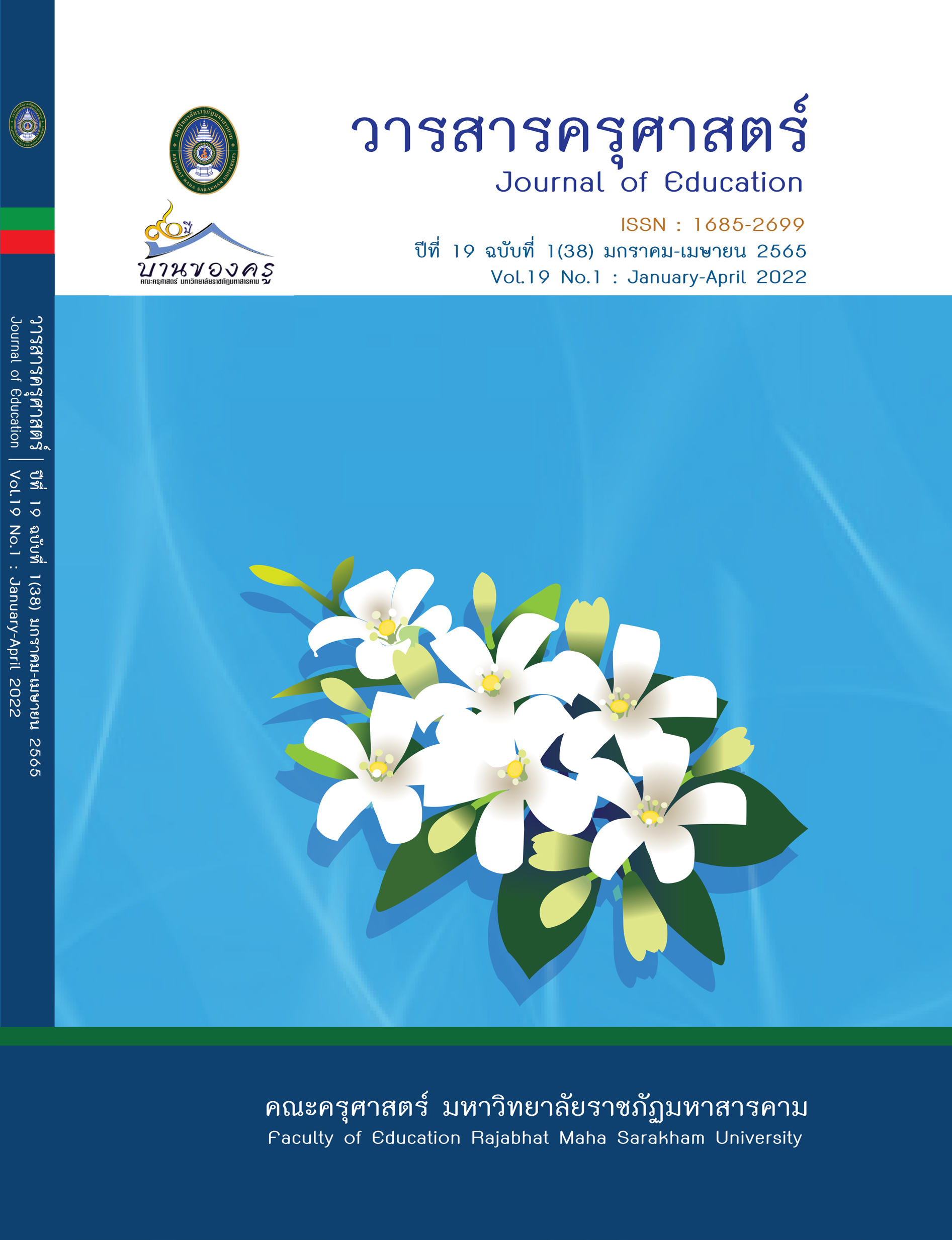Development of Analytical Thinking Skills of Social Policy in the Coronavirus (COVID–19) Pandemic Situation to Reflect the Learning Activities on Graphic Organizers for Students in the Social Administration Program
Main Article Content
Abstract
This research aimed to reflect on learning activities with graphic organizers and develop the analytical thinking skills of social policy in the coronavirus (Covid-19) pandemic situation for students in the social administration program. The key informants were graduated students of the Faculty of Humanities and Social Sciences of Prince of Songkla University, Pattani Campus. The purposive sampling of 5 students enrolled in an online classroom of the Administration Theory and Social Management Application course in the first semester of the 2021 academic year. The research equipments included 5 planned learning activities and totaling 15 hours in the social policy analysis process, an analytical thinking skills assessment form and a reflective note on learning activities with graphic organizers. The data analysis was content analysis for creating inductive conclusions and descriptions.
The results showed that the reflection on learning activities with graphic organizers wererelated to social policy analysis process for enhancing the learning efficiency and enable analytical thinking skills development in comparison and forecasting the impacts of social policy on social-economic solutions of government projects in the COVID-19 pandemic.
Article Details

This work is licensed under a Creative Commons Attribution-NonCommercial-NoDerivatives 4.0 International License.
ข้อกำหนดเบื้องต้นที่ผู้นิพนธ์(ผู้ส่งบทความ) ควรทราบ
1. ผู้นิพนธ์ที่ประสงค์จะลงตีพิมพ์บทความกับวารสาร ตั้งแต่เดือนมกราคม 2563 เป็นต้นไป ให้ใช้รูปแบบใหม่ (Template 2563) โดยสามารถดูตัวอย่างได้ที่เมนู GUIDELINES
2. จะตีพิมพ์และเผยแพร่ได้ ต้องผ่านการประเมินจากผู้ทรงคุณวุฒิ (Peer Review)
3. การประเมินบทความโดยผู้ทรงคุณวุฒิ (Peer Review) เป็นแบบ Double Blind
4. การอ้างอิงบทความใช้หลักเกณฑ์ APA (American Psychological Association) คลิก
5. บทความถูกปฏิเสธการตีพิมพ์ ไม่ผ่านการประเมิน ผู้นิพนธ์ขอยกเลิกเองหรือชำระเงินก่อนได้รับการอนุมัติ ทางวารสารไม่มีนโยบายการคืนเงิน
References
กระทรวงการอุดมศึกษา วิทยาศาสตร์ วิจัย และนวัตกรรม. (2564). ปรัชญาการอุดมศึกษาไทย และระบบอุดมศึกษาใหม่ ด้านการสร้างบัณฑิต และพัฒนากำลังคน. ราชกิจจานุเบกษา เล่ม 138 ตอนพิเศษ 144 ง.
กุลิสรา จิตรชญาวณิช. (2562). การจัดการเรียนรู้. สำนักพิมพ์แห่งจุฬาลงกรณ์มหาวิทยาลัย.
ขจรศักดิ์ หอมสมบัติ และอนุสรณ์ จันทร์ประทักษ์. (2564). การพัฒนากิจกรรมการเรียนรู้แบบโครงงานเป็นฐาน รายวิชาอุปกรณ์อิเล็กทรอนิกส์ และวงจรเพื่อส่งเสริมทักษะปฏิบัติสำหรับนักเรียนระดับชั้นประกาศนียบัตรวิชาชีพปีที่ 1 วิทยาลัยเทคโนโลยีธีรภาดา. วารสารครุศาสตร์ มหาวิทยาลัยราชภัฏมหาสารคาม, 15(2), 55-66.
ทิศนา แขมมณี. (2550). ศาสตร์การสอน. จุฬาลงกรณ์มหาวิทยาลัย.
ธัญญา ผลอนัตน์ และขวัญฤดี ผลอนันต์. (2550). Mind Map กับการศึกษา และการจัดการความรู้. ขวัญข้าว.
ปัณณ์ พัฒนศิริ. (2564, 28 ธันวาคม). เกร็ดการเงิน. COVID-19 Education Disruption ส่งผลต่อคุณภาพการศึกษาอย่างไร? กรุงเทพธุรกิจ, https://bangkokbiznews.com/columnist/966219
ฝ่ายวิชาการโรงเรียนปรินส์ รอยแยลส์วิทยาลัย. (2564). เอกสารประกอบการอบรม การนำจุดเน้นงานวิชากา ปีการศึกษา 2564 สู่การปฏิบัติ. แผนกพัฒนาวิชาชีพ และส่งเสริมคุณภาพครู และบุคลากร.
ไพศาล หวังพานิช. (2543). การวัด และการประเมินผลระดับอุดมศึกษา. ชวนพิมพ์.
ภัทรา นิคมานนท์. (2543). การประเมินผลการเรียน. (พิมพ์ครั้งที่ 3). อักษรพิพัฒน์.
ศิริลักษณ์ แก้วสมบูรณ์. (2543). ผลการใช้เทคนิคผังกราฟฟิกในการเรียนการสอนวิทยาศาสตร์ที่มีผลต่อการนําเสนอ
ข้อความรู้ด้วยผังกราฟิกและผลสัมฤทธิ์ทางการเรียนของนักเรียนชั้นมัธยมศึกษาตอนต้น. [วิทยานิพนธ์ปริญญามหาบัณฑิต ไม่ได้ตีพิมพ์]. จุฬาลงกรณ์มหาวิทยาลัย.
สมชาย รัตนทองคำ. (2554). เอกสารประกอบการสอนทางกายภาพบำบัด. อัดสำเนา.
สุปรียา ตันสกุล. (2540). ผลของการใช้รูปแบบการสอนแบบการจัดข้อมูลด้วยแผนภาพที่มีต่อสัมฤทธิ์ผล
ทางการเรียนและความสามารถทางการแก้ปัญหาของนักศึกษาระดับปริญญาตรีชั้นปีที่ 2. [วิทยานิพนธ์ปริญญามหาบัณฑิต ไม่ได้ตีพิมพ์]. จุฬาลงกรณ์มหาวิทยาลัย.
สำนักงานคณะกรรมการการศึกษาขั้นพื้นฐาน. (2548). คู่มือการจัดการเรียนรู้ กลุ่มสาระการเรียนรู้คณิตศาสตร์.
โรงพิมพ์องค์การรับส่งสินค้า และพัสดุภัณฑ์.
อักษร เอ็ดดูเคชั่น. (2564, 28 ธันวาคม). การเรียนรู้ใหม่ในวิถี, New Normal. https://aksorn.com/new-normal-1
Ausubel, D. P., and F. G. Robinson. (1969). School Learning: and Introduction to Education Psychology.
Holt, Rinehart and Winston.
Clarke, J. H. (1991). Using visual organizers to focus on thinking. Journal of Reading, 34 (7), 526-534.
Dewey. (1963). Experience and Education. Macmillan.
Gibbs, G. (1988). Learning by doing: A guide to teacher and learning methods. Oxford Brookers
University.
Jones, B. F., Pierce. J. & Honter, B. (1989). Teaching students to construct graphic organizers. Educational
Leadership, 46 (4). 20-25
Johns, C. (2000). Becoming a Reflective Practitioner. Blackwell; Science.
Joyce, B., Weil, M. & Shower, B. (1992). Model of teaching. Boston: Allyn and Bacon.
Ministry of Education Republic of Singapore. (2013). A Curriculum for Kindergartens in Singapore: Discovery of the
world. Singapore.


